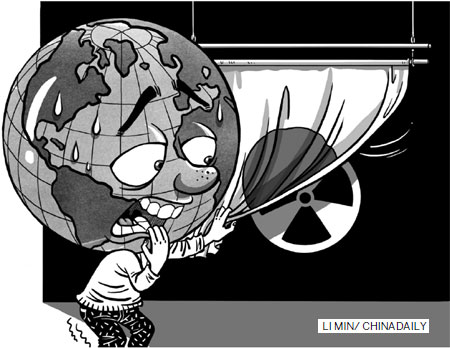
Japan has nuclear weapons capability
Updated: 2014-03-24 08:28
By Yin Xiaoliang (China Daily)
Comments Print Mail Large Medium SmallWhile the world is wondering what the 2014 Nuclear Security Summit, held on Monday and Tuesday in The Hague, the Netherlands, will achieve, Tokyo is busy working on a draft statement, due to be considered in a nuclear disarmament meeting in Hiroshima next month, aimed at urging China to engage in nuclear arms reduction talks with the United States and Russia. As a driving force behind the efforts to pressure China, Japan is choosing to ignore the gap between the size of China's nuclear arsenal and those of the US and Russia, which are by far the largest in the world.
For years, Japanese society has had mixed feelings about nuclear, stuck between the actual demand for nuclear power and the painful memories tied to the atomic bombings of Hiroshima and Nagasaki (and more recently the Fukushima nuclear power plant disaster). The question is whether the government will be able to overcome the public's reluctance to find its way into the nuclear weapon club.
Technically speaking, a country has to meet several requirements to become a nuclear weapon state: It needs possession of highly enriched plutonium and uranium, and the technologies needed for the manufacture of nuclear weapons and the delivery technologies and systems used to bring a nuclear weapon to its target, and last but not least, it needs the political determination to develop a nuclear arsenal. So has Japan met all these requirements?
Let's take a quick look at Japan's stockpile of nuclear materials. According to the data released by the Atomic Energy Commission of Japan, Japan possessed 44.3 tons of plutonium in 2012, of which 9.3 tons were stockpiled at home and 35 tons kept abroad in countries such as the United Kingdom and France. This even exceeds the 38 tons of weapons-grade plutonium the US previously claimed to hold. By the standard that 8 kilograms of plutonium are needed to produce a nuclear weapon, Japan's stockpile is enough for more than 5,000 nuclear weapons, an arsenal that is large enough to wipe out life on Earth.
In addition, Japan has a competitive nuclear power industry and one of the most advanced civilian nuclear programs worldwide, which has laid a solid technological foundation for its manufacture of nuclear weapons. The country also boasts various types of nuclear reactors and the centrifuge techniques needed for the uranium enrichment process. All the aforementioned can be converted into military use to accommodate the changes in Japan's nuclear policies.
It is impossible for a country to produce nuclear weapons without conducting weapon tests. However, given its possession of world-class supercomputers and its competence in inertial confine fusion, or ICF, a type of fusion energy research that attempts to initiate nuclear fusion reactions, Japan is highly capable of conducting simulated tests and is thus able to produce a nuclear weapon and guarantee its effectiveness, yield and explosive capabilities without actual physical testing.
Still a nuclear weapon also requires delivery technologies and systems. Since the end of World War II, Japan has attached great importance to developing aerospace technologies and solid-fuel rockets. Japan already has highly advanced solid-fuel launch vehicles and has already accumulated the technical data needed for developing intercontinental ballistic missiles. In theory, its H-II rocket, the satellite launch system, can be rebuilt into a ballistic missile to deliver nuclear weapons.
Now let's take another look at Japanese politics, which plays a key role in formulating the nation's nuclear policies. In recent years, the Japanese political circle has shown an increasing inclination toward right-wing conservatism. Driven by this, the military circle has undergone some changes. First and foremost is the higher administrative status of the military bodies. Japan's Defense Agency, established in 1954, was upgraded to the status of a full ministry in 2007, and the Abe administration is seeking to upgrade the Self-Defense Forces to a full-scale national defense force. Besides, the ruling party intends to ease the self-imposed ban on weapon exports that has been in place since 1967 to boost the country's defense influence, and furthermore, Tokyo has gone beyond the concept of "static" defense within its own territory to adopt so-called dynamic defense, which allows SDF units to be dispatched abroad and military bases to be set up overseas.
Given the inconsistency in its defense policy, it is not much a surprise that Tokyo maintains an ambiguous position over nuclear weapons. The Three Non-Nuclear Principles, namely that Japan should neither possess nor manufacture nuclear weapons, nor shall it permit their introduction into Japanese territory, were first outlined in 1967 by then Japanese prime minister Eisaku Sato, but when visiting the US in 1969, Sato signed a secret agreement with then US president Richard Nixon, which allows the US to bring nuclear weapons into Japan in violation of the tenets.
Japan also refused to sign a joint statement during the conference on the non-proliferation of nuclear weapons in Geneva, Switzerland, in April 2013, despite being the only country that has ever been the victim of atomic bombs.
Today, right-wing politicians, such as Shintaro Ishihara, are the most outspoken advocates of building nuclear weapons to counter threats from China and the Democratic People's Republic of Korea, but such opinions have invited less strong criticism from the Japanese society than before.
Obviously, Japan has met the three "physical" requirements for making and delivering nuclear weapons, and the determinant for it to become a nuclear-weapon state falls upon the country's nuclear policymaking. What is disturbing is its ongoing campaign to peddle itself as an advocate of nuclear arsenal reduction threatened by a belligerent neighbor.
By doing so, Tokyo is seeking to mislead international opinion, and by playing up a threat from China, alter its status as a non-nuclear weapon state. This should be a good reason for the international community to raise its guard.
The author is a researcher with the Institute of Japan Studies, Nankai University.







